#sir richard Francis burton
Explore tagged Tumblr posts
Text
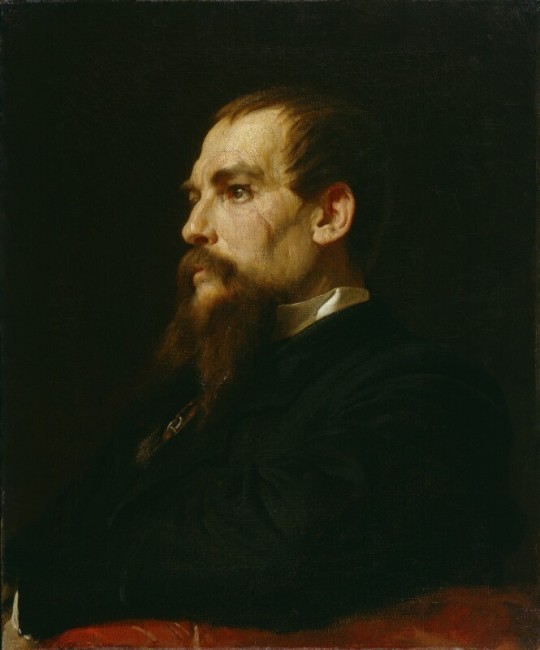
Sir Richard Francis Burton (1872-75)
Frederic Leighton (1830-1896)
5 notes
·
View notes
Text


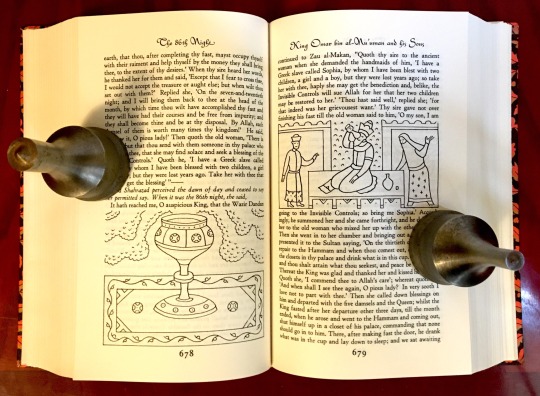

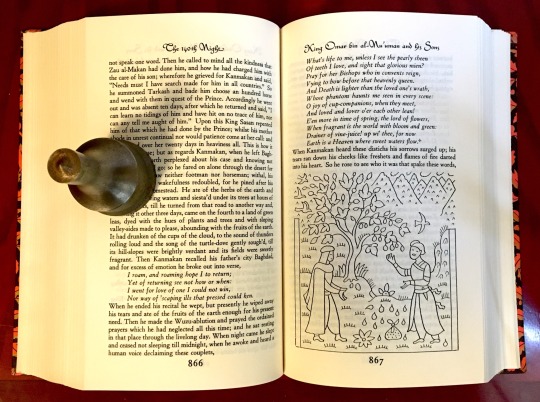
Book 353 & 354 & 355
The Book of the Thousand Nights and a Night: A Plain and Literal Translation of the Arabian Nights Entertainments (3-volume set)
Translated and Annotated by Richard F. Burton / illustrated by Valenti Angelo
The Heritage Press 1962
This three-volume set from The Heritage Press is a reprint of a six-volume set published by the Limited Editions Club in 1934, which was based on an edition of Burton’s complete translation published in 1885. While this is a handsome set and the 1,001 simple line drawings by Valenti Angelo have a certain kind of naive charm, I have to admit that I find Burton’s translation an incredibly clunky reading experience, although his notes are extensive and occasionally quite interesting.
#bookshelf#illustrated book#library#personal library#personal collection#books#book lover#bibliophile#booklr#the book of the thousand nights and a night#sir richard Francis burton#heritage press#folktales
9 notes
·
View notes
Text

“Cease, man, to mourn, to weep, to wail; Enjoy thy shining hour of sun; We dance along Death's icy brink, But is the dance less full of fun?”
~ Sir Richard Francis Burton (1880). “The Kasîdah (couplets) of Hâjî Abdû El-Yezdî: A Lay of the Higher Law”
0 notes
Text
Thought, Mathew Rhys (who I admittedly only know as Belos in The Owl House) would be really good as either Burton or Dee in an animated adaptation of CotIG. Dee more so…evil. Possibly. Probably other possibilities, but that’s the ones coming to mind. Such a good voice.
make of that what you will
#Mathew Rhys#CotIG#the Owl House#Dr. John Dee#Sir Richard Francis Burton#Chronicles of the Imaginarium Geographica
0 notes
Note
What are you currently reading?
I've been having trouble getting into just one book lately, so I've currently been reading parts of several books, hoping one of them hooks me. Guess what? That's literally never worked any time I've ever tried it, and yet, I still do it constantly. It always ends up taking me longer to read everything than if I just read the books one after the other.
Anyway, this is what I'm in the middle of right now, all of which are too interesting to keep me from focusing on just one at a time:
•Lady First: The World of First Lady Sarah Polk (BOOK | KINDLE) by Amy Greenberg •The Victorian Internet: The Remarkable Story of the Telegraph and the Nineteenth Century's On-Line Pioneers (BOOK | KINDLE) by Tom Standage •King Faisal of Saudi Arabia: Personality, Faith and Times (BOOK | KINDLE) by Alexei Vassiliev
I'm also still on the Richard Francis Burton kick that I mentioned last year, so I've been reading these too: •Captain Sir Richard Francis Burton: The Secret Agent Who Made the Pilgrimage to Mecca, Discovered the Kama Sutra, and Brought the Arabian Nights to the West by Edward Rice •The City of the Saints: Among the Mormons and Across the Rocky Mountains to California (BOOK/PUBLIC DOMAIN LINK) by Sir Richard Francis Burton
#Books#History#Reading List#Lady First: The World of First Lady Sarah polk#Amy Greenberg#The Victorian Internet#Tom Standage#King Faisal of Saudi Arabia#Alexei Vassiliev#Captain Sir Richard Francis Burton#The City of Saints#Richard Francis Burton#Edward Rice
6 notes
·
View notes
Text

Of the gladdest moments in human life, methinks, is the departure upon a distant journey into unknown lands. Shaking off with one mighty effort the fetters of habit, the leaden weight of routine, the cloak of many cares and the slavery of civilisation, man feels once more happy.
- Sir Richard Francis Burton, explorer and author
#burton#sir richard burton#quote#explorer#travel#traveller#exploration#suitcases#wanderlust#femme#adventure
523 notes
·
View notes
Text
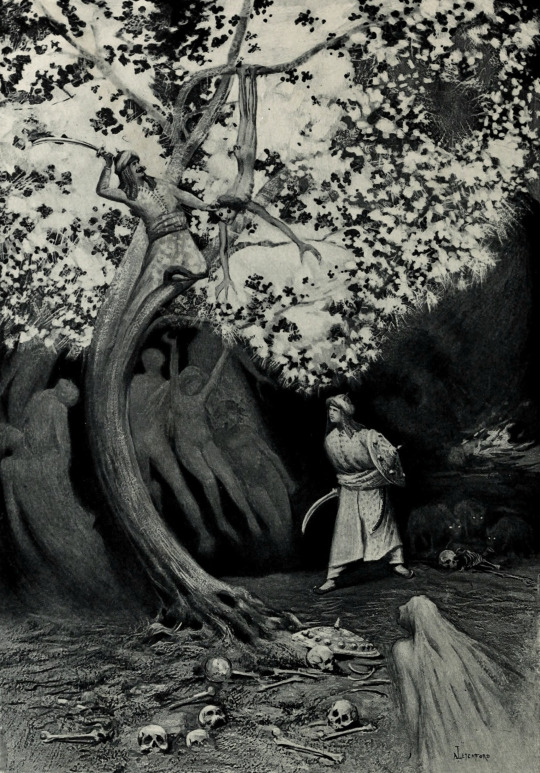
Albert Letchford - Frontispiece for Sir Richard Francis Burton's 'Vikram and the Vampire, or, Tales of Hindu Devilry', 1893.
#albert letchford#vikram and the vampire#sir richard burton#horror art#frontispiece#victorian gothic#art#illustration
63 notes
·
View notes
Text
books i read in 2023
my goal was to read a book a week and while the timeline wasn't perfectly even, i did manage to get it to add up (and then some!). this year i focused on religion and philosophy as well as classics (of which im counting both as traditional "ancient or pre-modern famous and outstanding" types of books, but also famous more modern books). i also bolded some books that were really good in my opinion that have really stuck with me so if you are interested in the genre i'd suggest those
st joan by bernard shaw (play)
mary and your everyday life by bernard haring (theology)
theology of liberation by gustavo gutierrez (theology)
magnificat by elizabeth ruth obbard (theology)
piedras labradas by victor montejo (poetry)
the boy who was raised as a dog by bruce perry and maia szalavitz (psychology)
4 great plays by ibsen - the dollhouse, ghosts, the wild duck, and an enemy of the people by henry ibsen (plays obvi)
the night of the iguanas by tennessee williams (play)
being logical by dq mcinerny (idk sociology maybe? it was about recognizing and avoiding bad-faith arguments and logical fallacies)
the alchemist by paolo coelho (classics)
frankenstein by mary shelly (classics)
an american tragedy by theodore dreiser (classics)
is this wifi organic? by dave farina (idk how to classify this one either but it was also about recognizing bad-faith arguments, specifically when it comes to pseudoscience)
the nicaraguan church and the revolution by joseph muligan (theology, history)
catholic social teaching: our best kept secret by peter henriot, edward deberri, and michael schultheis (theology)
beowulf (classics)
sapiens by yuval noah harari (anthropology)
the church and the second sex by mary daly (theology)
mary in the new testament edited by raymond brown, karl donfried, joseph fitzmyer, and john reumann (theology)
a catholic devotion to mary by oscar lukefahr (theology)
1001 nights / arabian nights trans. sir richard burton (classics)
a house on mango street by sandra cisneros (poetry)
primary source readings in catholic church history edited by robert feduccia and nick wagner (theology)
doing faithjustice by fred kammer, sj (theology)
winds of change by isaac asimov (sci-fi)
the sound and the fury by william faulkner (classics)
una ciudad de la españa cristiana hace mil años by claudio sanchez-albornoz (history)
the glass menajerie by tennessee williams (play)
reinventing the enemy's language by joy harjo and gloria bird (indigenous women writers anthology)
the great gatsby by f scott fitzgerald *reread* (classics)
the bell jar by sylvia plath (classics)
the kite runner by khaled hosseini (classics)
one nation, under gods by peter manseau (history)
development as freedom by amartya sen (economic / political philosophy)
women in ministry: four views edited by bonnidell and robert g clouse (practical theology)
mother of god: a history of the virgin mary by miri rubin (theology / history)
a study in scarlet and the sign of four by sir arthur conan doyle (classics)
adventures of sherlock holmes by sir arthur conan doyle (classics)
the casebook of sherlock holmes by sir arthur conan doyle (classics)
the valley of fear by sir arthur conan doyle (classics)
the memoirs of sherlock holmes by sir arthur conan doyle (classics)
the return of sherlock holmes by sir arthur conan doyle (classics)
the hound of the baskervilles by sir arthur conan doyle (classics)
his last bow by sir arthur conan doyle (classics)
the fundamentals of ethics, fourth edition by russ shafer landau (philosophy)
dracula by bram stoker (classics) (yes i'm counting dracula daily)
desde mi silencio by carmen gomez (poetry)
happiness in this life, excerpts from the homilies of pope francis (theology)
the vigilante / the snake / the chrysanthemums by john steinbeck (classics)
quest for the living god by sister beth johnson *reread* (theology)
the adventures of tom sawyer by mark twain (classics)
the adventures of huckleberry finn by mark twain (classics)
the boys in the boat by daniel james brown (history)
and that's all folks, ending the year with some classics, plus my mom insisted i read the boys in the boat while im home for christmas because she wanted to see the movie lol. i got so many books for christmas so i'll be startin off strong next year too, and my goal is finishing my collection of john steinbeck, by which i mean obtaining as well as reading everything i can find by him. here's my list from 2022 and i'll see you next year
#books#bookblr#reading#literature#classic lit#john steinbeck#philosophy#religion#classics#sherlock holmes#mystery#psychology#theology#history#poetry#sociology
27 notes
·
View notes
Text
Gorgeous wilderness description opens "The Avenging Angels," part 12 of Letters from Watson. I wonder how much was inspired by Sir Richard Francis Burton's The City of Saints, recounting his travels in the west and visit to Brigham Young.
Our fleeing party is initially in the Oquirrh Mountains west of Salt Lake City.

The modern highway route skirts the Oquirrhs, in favor of a straight run across the salt flats.
If Ferrier, Lucy, and Jefferson Hope really made 30 miles in their first days, they reached the Cedar Mountains, which are less terrifyingly craggy but very much a desert. Deseret Peak is the pinnacle of this range, though any route across would look for a lower pass.

Were they to make it into what's now Nevada -- with Carson City clear the other side of the state -- there'd be a lot more of this. It's not hospitable country even today.
The big horn sheep is exotically western! And genuine! I am distracted from Jefferson Hope's wasting much of his kill by the discovery that the Sierra Nevada mountains (California - Nevada border, nowhere near our fleeing party yet, but important to me IRL) have their own genetically distinct big horn population.
Hope's slaughtered big horn is likely a Rocky Mountain big horn.
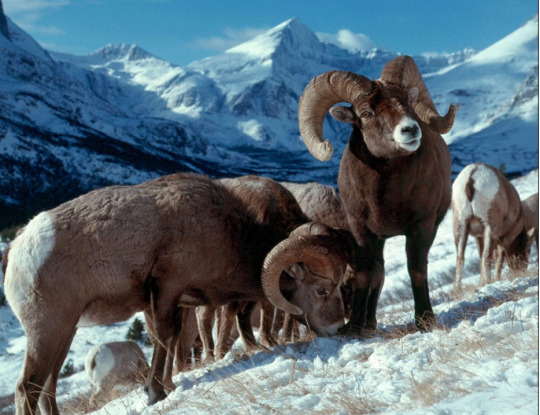
Of course, it's all a disaster. Everyone had to be doomed by the narrative in some way.
But we get an exact date: August 4, 1860.
Camp Floyd, the U.S. Army camp for the occupation of Utah following the Utah War of 1857-8, was right at the south end of the Oquirrh Mountains. Jefferson Hope had the option of hiding Ferrier and Lucy in the mountains and walking them right into the protection of the U.S. military. Maybe there were too many LDS settlers in the low spots in between (though I think Doyle didn't know or remember that the Utah War had happened).
Now comes the crucial moment that chafes me hard.
As the young fellow realized the certainty of her fate, and his own powerlessness to prevent it, he wished that he, too, was lying with the old farmer in his last silent resting-place. Again, however, his active spirit shook off the lethargy which springs from despair. If there was nothing else left to him, he could at least devote his life to revenge.
What about rescuing Lucy after she's married? Okay, Jefferson Hope can't get back to Salt Lake City in time to prevent a forced marriage. However, we're told later that she was a marriage prize primarily for control of her father's property. Once that's in the hands of her husband, would he bother pursuing her? In this period, marriage would make it his and eliminate her rights to it. (I'm assuming nobody is disputing the legality of polygamous marriages in this universe.)
Jefferson Hope really seems to buy in that once married (against her will), Lucy is legitimately another man's property. Admittedly, it's an era when pressuring an heiress into marriage was seen as fairly acceptable, if one's table manners were good. The burden was on the young woman to be too wise and firm to give in, and yet when Lucy shows fine judgment and takes action to avoid the match, she's taken by force. The system is so completely rigged against her; no wonder she can't find any hope to live for.
The schism that sends Drebber and Stangerson on their merry way appears to be fictional, as the Reorganized LDS under Joseph Smith III in the Midwest is too early (1861) and the Godbeites in SLC is too late (1869).
By the end of Jefferson Hope's epic pursuit from Russia to France to Denmark to England. we have now accounted for Drebber's existence in Cleveland, his employment of Stangerson, the gold ring, and the note about how Jefferson Hope is in Europe.
We have not accounted for why Drebber would go arm in arm with his enemy into a vacant house.
16 notes
·
View notes
Text

🔸 Sir Richard Francis Burton (1821-1890) was a notorious superhero (or antihero) and swordsman of the Victorian era. While at Trinity, the half-Irish Burton challenged another student to a duel for mocking his moustache. Burton learned 29 languages and became proficient in fencing. During an expedition to Africa, he was impaled with a native spear, the point entering one cheek and exiting the other, and leaving a scar that can be seen in this photo. He was forced to make his escape with the weapon still stuck through his face. Along with participating in clandestine operations, Burton was renowned for his fighting skills and earned the nickname "Ruffian Dick" because he had "fought in single combat more enemies than perhaps any other man of his time." Burton authored a number of important texts on the sword (including Sword & Bayonet Exercises, a classic book on the history of the Sword, and his "Sentiment of the Sword" about fencing) and translated a number of important Eastern cultural and mythological texts. A scholar, spy, and world explorer, he also had an interest in the occult, native sexual practices, drugs, runes, snake charming, was initiated into an esoteric Sufi brotherhood, as well as into a Hindu sect, all of which made him a subject of controversy and fascination in his time. A linguist, he reportedly learned to identify up to 60 monkey "words," which he recorded in a "monkey vocabulary." In 1886, Queen Victoria made him Knight Commander of St. Michael and St. George.
#victorianchaps #britishicons #heroes
#painting#abstraction#painters painting#abstract painting#art studio#the painting space#collage#art#photography#60s style#britishheroes#victorianchaps
5 notes
·
View notes
Text
#OTD in Irish History | 19 March:
In the Liturgical calendar, today is the feast of St Joseph. According to legend, this is a lucky day to be born in the Highlands, where they say children born today cannot be killed in battle. 1642 – Charles I’s ‘Adventurers’ Act’ offers confiscated Irish land in return for investment in the reconquest. 1821 – Birth in Dublin of Sir Richard Francis Burton, adventurer, writer, swordsman, scholar…

View On WordPress
#irelandinspires#irishhistory#OTD#19 March#Gareth Wray Photography#History#History of Ireland#Ireland#Irish Civil War#Irish History#Irish War of Independence#Today in Irish History
3 notes
·
View notes
Text
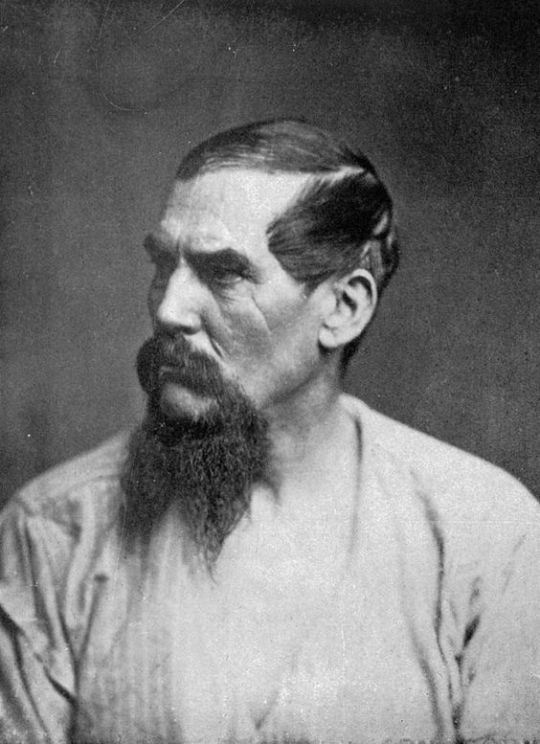
Soldier, explorer and anthropologist Sir Richard Francis Burton (1821-1890) a/k/a Ruffian Dick. I don't know how to view this man, he started out as the product of a prim Victorian culture, in which at home taboo mostly trumped sexual obsession, but men did not stop obsessing about sex. He found himself best when abroad where he travelled as a soldier and explorer, and he studied many cultures across the world. There he closely observed, and wrote down in detail, the raw hedonism and piety of the world around him that England wanted to rule over by ignoring how it worked. However much he learned about the world outside England, Victorian society made sure the core of it would not be passed on. When he died his wife burned most of his private papers. Get the proper story of him here.
10 notes
·
View notes
Text
If you ever thought that your OC is Mary/Marty Sue (ish), remember Mark Hodder and his sir Richard Francis Burton - he is linguist, translator, geographer, fencer, hypnotist and many more.
And then check the Wiki page of sir Richard (he was a real person) and see that he indeed was a linguist, translator, geographer, fencer, hypnotist and many more.
#.txt#on OCs#I read Mark Hodder's series about Burton and Swinburne and just thought about it#when I first read the book I thought he was too cool#but then I found out that he really did all those things#and also it made me to learn more languages
5 notes
·
View notes
Text
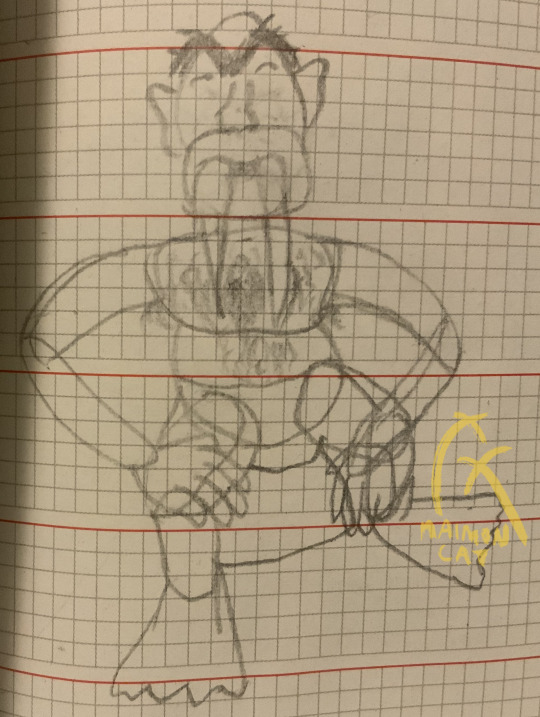
Another old sketch for #orctober
Back then I wanted to draw the ogre from the first story of Basile‘s “Tale of Tales” in this pose: “… where, at the entrance of a pumice cave, sitting on the root of a poplar tree, he found an ogre, and goodness gracious. Was he ugly! His head was larger than an Indian gourd, his forehead full of bumps, his eyebrows united, his eyes crooked, his nose flat, with nostrils like a forge, his mouth like an oven, from which protruded two tusks like unto a boar's ; a hairy breast had he, and arms like reels ; and bandy-legged was he, and flat-footed like a goose; briefly he was an hideous monster, frightful to behold, who would have made a Roland smile, and would have frightened a Scannarebecco ;” -Giambattista Basile, “The Tale of Tales”, translation based on that of sir Richard Francis Burton
Allora volevo provare a disegnare in questa posizione con la descrizione dell‘orco nella prima fiaba de “Lo cunto de li cunti” di Basile:
“Colà, sulla radice di un pioppo, presso una grotta lavorata di pietra pomice, era seduto un orco: o mamma mia, quanto era brutto! Era nano e sconcio di corpo, aveva il capo più grosso d’una zucca d’india, la fronte bernoccoluta, le soprac- ciglia congiunte, gli occhi stravolti, il naso schiacciato, con due narici che parevano due chiaviche maestre; una bocca quanto un palmento, dalla quale uscivano due zanne che gli giungevano ai malleoli; il petto peloso, le braccia di aspo, le gambe piegate a vòlta, e i piedi larghi di papera. Insomma, pareva un diavolo, un parasacco, un brutto pezzente e una mal’ombra spiccicata, che avrebbe sbigottito un Orlando, atterrito uno Scannarebecco, e fatto cadere in deliquio il più abile schermitore.” -Giambattista Basile, “Il Pentamerone ossia La Fiaba delle Fiabe”, traduzione di Benedetto Croce
Damals wollte ich versuchen, den Wilden Mann aus Basiles „Märchen der Märchen“ in dieser Position zu zeichnen: „Hier sah er auf dem Stumpf einer Pappel neben einer Grotte aus Bimsstein einen wilden Mann sitzen. O steh mir bei, wie häßlich sah der aus! Er war ein ganz kleiner Knirps und nicht größer als ein Zwerg; er hatte aber einen Kopf, dicker als ein indischer Kürbis, eine blättrige Stirn, die Augenbrauen zusammengewachsen, verdrehte Augen, eine platte Nase mit zwei Nasenlöchern, die zwei Kloaken schienen, einen Mund so groß wie eine Kelter, aus welchem zwei Hauer hervorragten, die ihm bis an die Fußspitzen gingen, eine zottige Brust, Arme wie eine Garnwinde, Beine wie eine Bogenwölbung und Füße so flach wie die einer Gans; mit einem Wort, er schien ein Popanz, ein Teufel, ein häßliches Fratzengesicht und ein wahres Schreckgespenst, das selbst einen Roland hätte in Angst setzen, einem Achilles den Mut rauben und einen Bettelbruder abschrecken können.„ - Giambattista Basile, „Das Pentameron”, übersetzt von Felix Liebrecht
#orc#orco#ogre#uerco#fairy tales#folk tales#folklore#my artwork#my art#old art#sketch#sketchbook#pentamerone#tale of tales#lo cunto de li cunti#Il racconto dei racconti#Das Märchen der Märchen#Pentameron#wild man#wilder mann#october#orctober
3 notes
·
View notes
Text

The novel "To Your Scattered Bodies Go" by Philip J. Farmer was published for the first time between 1965 and 1966 in the magazine "Worlds of Tomorrow" and in 1971 as a book. It won the Hugo Award for Best Novel of the Year. It's the first book in the Riverworld series.
Sir Richard Francis Burton dies in 1890 but wakes up in an unknown place where he finds himself surrounded by other people who, just like him, are naked and totally hairless but he seems to be the only one awake. He's trying to figure out what's going on when everyone is thrown into a valley next to a river.
The people in the valley include an alien from the Tau Ceti system who arrived on Earth in the early 21st century and a Neanderthal. Everyone says they died and found themselves there. On the riverside, there seem to be people everywhere, who could have created such an environment and resurrected all the sentient beings that ever existed on Earth?
3 notes
·
View notes
Text
Self-Defense for Gentlemen and Ladies
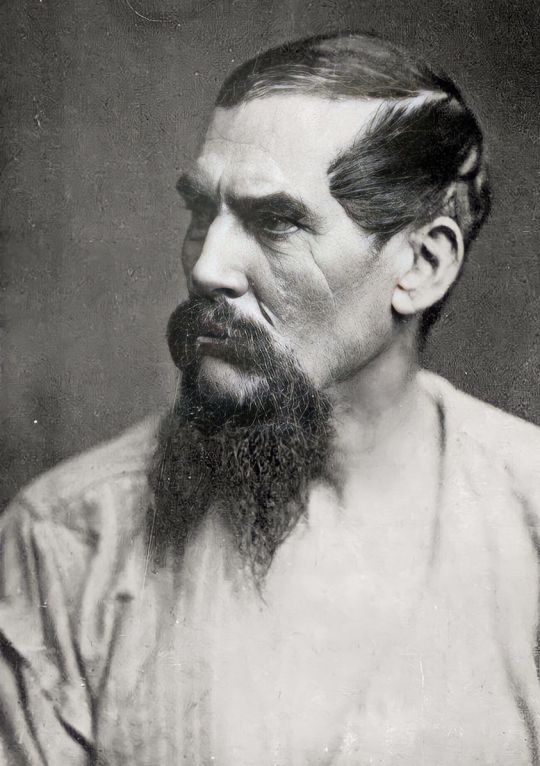
Sir Richard Francis Burton (1821-1890) was a notorious superhero (or antihero) and swordsman of the Victorian era. While at Trinity, the half-Irish Burton challenged another student to a duel for mocking his moustache. Burton learned 29 languages and became proficient in fencing. During an expedition to Africa, he was impaled with a native spear, the point entering one cheek and exiting the other, and leaving a scar that can be seen in this photo. He was forced to make his escape with the weapon still stuck through his face. Along with participating in clandestine operations, Burton was renowned for his fighting skills and earned the nickname "Ruffian Dick" because he had "fought in single combat more enemies than perhaps any other man of his time." Burton authored a number of important texts on the sword (including Sword & Bayonet Exercises, a classic book on the history of the Sword, and his "Sentiment of the Sword" about fencing) and translated a number of important Eastern cultural and mythological texts. A scholar, spy, and world explorer, he also had an interest in the occult, native sexual practices, drugs, runes, snake charming, was initiated into an esoteric Sufi brotherhood, as well as into a Hindu sect, all of which made him a subject of controversy and fascination in his time. A linguist, he reportedly learned to identify up to 60 monkey "words," which he recorded in a "monkey vocabulary." In 1886, Queen Victoria made him Knight Commander of St. Michael and St. George.
6 notes
·
View notes